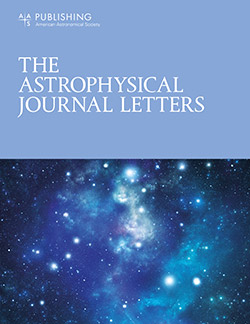The Supersonic Project: Star Formation in Early Star Clusters without Dark Matter
IF 8.8
1区 物理与天体物理
Q1 ASTRONOMY & ASTROPHYSICS
引用次数: 0
Abstract
Abstract The formation mechanism of globular clusters (GCs) has long been debated by astronomers. It was recently proposed that supersonically induced gas objects (SIGOs)–which formed in the early Universe due to the supersonic relative motion of baryons and dark matter at recombination–could be the progenitors of early GCs. In order to become GCs, SIGOs must form stars relatively efficiently despite forming outside of dark matter halos. We investigate the potential for star formation in SIGOs using cosmological hydrodynamic simulations, including the aforementioned relative motions of baryons and dark matter, molecular hydrogen cooling in primordial gas clouds, and explicit star formation. We find that SIGOs do form stars and that the nascent star clusters formed through this process are accreted by dark matter halos on short timescales (∼a few hundred megayears). Thus, SIGOs may be found as intact substructures within these halos, analogous to many present-day GCs. From this result, we conclude that SIGOs are capable of forming star clusters with similar properties to globular clusters in the early Universe, and we discuss their detectability by upcoming JWST surveys.超音速项目:没有暗物质的早期星团中的恒星形成
关于球状星团(GCs)的形成机制一直是天文学家争论的焦点。最近有人提出,在早期宇宙中由于重子和暗物质在重组时的超音速相对运动而形成的超音速诱导气体物体(SIGOs)可能是早期gc的祖先。为了成为GCs, sigo必须相对有效地形成恒星,尽管它是在暗物质晕之外形成的。我们利用宇宙流体动力学模拟来研究sigo中恒星形成的可能性,包括上述重子和暗物质的相对运动、原始气体云中氢分子的冷却以及明确的恒星形成。我们发现sigo确实形成了恒星,并且通过这一过程形成的新生星团是在短时间尺度(约几百亿年)内被暗物质晕吸积的。因此,sigo可能在这些光晕中被发现为完整的亚结构,类似于许多当今的gc。根据这一结果,我们得出结论,sigo能够形成与早期宇宙中球状星团具有相似性质的星团,我们将讨论即将到来的JWST调查中它们的可探测性。
本文章由计算机程序翻译,如有差异,请以英文原文为准。
求助全文
约1分钟内获得全文
求助全文
来源期刊

Astrophysical Journal Letters
ASTRONOMY & ASTROPHYSICS-
CiteScore
14.10
自引率
6.30%
发文量
513
审稿时长
2-3 weeks
期刊介绍:
The Astrophysical Journal Letters (ApJL) is widely regarded as the foremost journal for swiftly disseminating groundbreaking astronomical research. It focuses on concise reports that highlight pivotal advancements in the field of astrophysics. By prioritizing timeliness and the generation of immediate interest among researchers, ApJL showcases articles featuring novel discoveries and critical findings that have a profound effect on the scientific community. Moreover, ApJL ensures that published articles are comprehensive in their scope, presenting context that can be readily comprehensible to scientists who may not possess expertise in the specific disciplines covered.
 求助内容:
求助内容: 应助结果提醒方式:
应助结果提醒方式:


